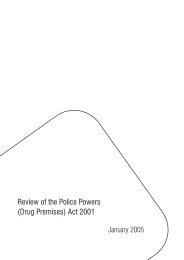Crimes (Forensic Procedures) Act 2000 - NSW Ombudsman - NSW ...
Crimes (Forensic Procedures) Act 2000 - NSW Ombudsman - NSW ...
Crimes (Forensic Procedures) Act 2000 - NSW Ombudsman - NSW ...
You also want an ePaper? Increase the reach of your titles
YUMPU automatically turns print PDFs into web optimized ePapers that Google loves.
Chapter 4. Implementation of the <strong>Act</strong><br />
This chapter describes the way the <strong>Act</strong> is implemented and the roles of each of the main stakeholders.<br />
The Attorney General is the minister responsible for the <strong>Act</strong>, but its implementation is largely split between <strong>NSW</strong> Police<br />
(investigation and sampling) and <strong>NSW</strong> Health (DNA analysis and database management). Experts who have specific<br />
skills or training also play a small role.<br />
4.1. <strong>NSW</strong> Police at a corporate level<br />
<strong>NSW</strong> Police implements the <strong>Act</strong> at a corporate level by maintaining Standard Operating <strong>Procedures</strong> (SOPs), training<br />
officers in forensic procedures, providing specialist forensic services and liaising with <strong>NSW</strong> Health.<br />
4.1.1. The <strong>Forensic</strong> Services Group (FSG)<br />
The <strong>NSW</strong> Police <strong>Forensic</strong> Services Group (FSG) provides specialist skills in the collection and preservation of physical<br />
evidence from crime scenes, suspects, victims and witnesses. Several units within FSG are involved with forensic<br />
procedures:<br />
• The <strong>Forensic</strong> <strong>Procedures</strong> Implementation Team (FPIT) was created specifically to oversee the implementation<br />
and operation of the <strong>Act</strong>. FPIT maintains a webpage on the police intranet with practical information about<br />
forensic procedures, including answers to frequently asked questions and the forms police may need, such<br />
as applications for court orders. The site is easy to navigate and has all the relevant <strong>NSW</strong> Police policies<br />
and procedures in the one place. FPIT also runs a 24 hour hotline for officers seeking advice about forensic<br />
procedures, and distributes information about cold links to relevant local area commands. It is also responsible<br />
for notifying the laboratory when DNA profiles taken from suspects and volunteers are due for destruction.<br />
FPIT will also oversee the transference of DNA profiles from the <strong>NSW</strong> database to CrimTrac, the National DNA<br />
database, if it goes ahead.<br />
• The Crime Scene Operations Branch is responsible for attending crime scenes to take photographs<br />
and collect physical evidence, including fingerprints and biological samples, like blood stains.<br />
• The Criminal Identification Specialist Branch deals with fingerprints taken as forensic procedures.<br />
• The Disaster Victim Identification Unit obtains DNA samples taken from relatives to help identify<br />
disaster victims.<br />
The <strong>NSW</strong> Government announced in March 2005 that it will provide $26 million for forensic services equipment and<br />
personnel. 264 This will be used to create 147 new forensic officer positions, in addition to the existing 345 scene<br />
of crime officers. It will also be used to create a new forensic science centre, which will amalgamate a number of<br />
existing forensic services within <strong>NSW</strong> Police into one central branch. It will examine, prioritise and analyse crime scene<br />
exhibits. However, it will not conduct DNA analysis – this will still be done by DAL with some analysis work being<br />
outsourced to a private laboratory.<br />
4.1.2. Standard Operating <strong>Procedures</strong> (SOPs)<br />
FPIT developed SOPs for police officers to use when conducting forensic procedures. There are 18 different SOPs,<br />
depending on the type of procedure and the attributes and circumstances of the person being tested, such as<br />
whether:<br />
• the person is a suspect, volunteer or victim<br />
• the person is an adult, child or incapable person<br />
• the person is under arrest<br />
• the person is Aboriginal or Torres Strait Islander<br />
• the procedure is intimate or non-intimate, and<br />
• the procedure is conducted by consent, court order or senior police officer order.<br />
40<br />
<strong>NSW</strong> <strong>Ombudsman</strong><br />
DNA sampling and other forensic procedures conducted on suspects and volunteers under the <strong>Crimes</strong> (<strong>Forensic</strong> <strong>Procedures</strong>) <strong>Act</strong> <strong>2000</strong>

















